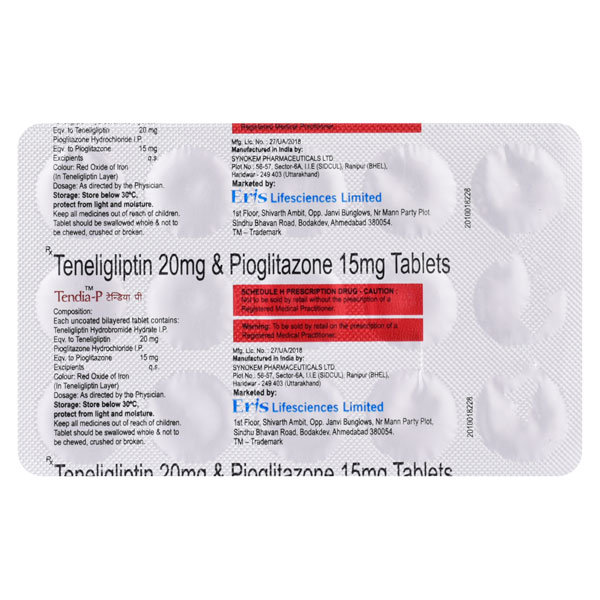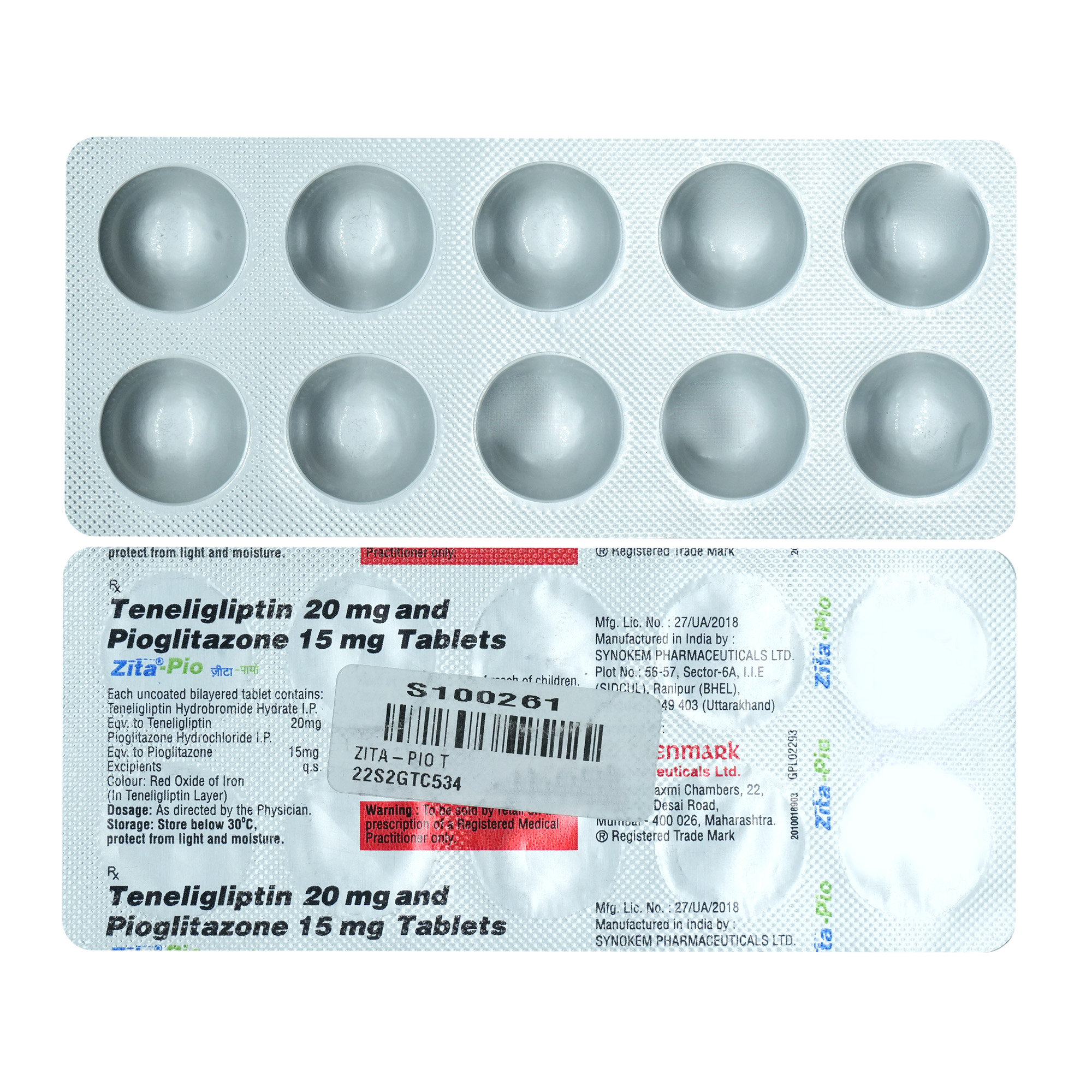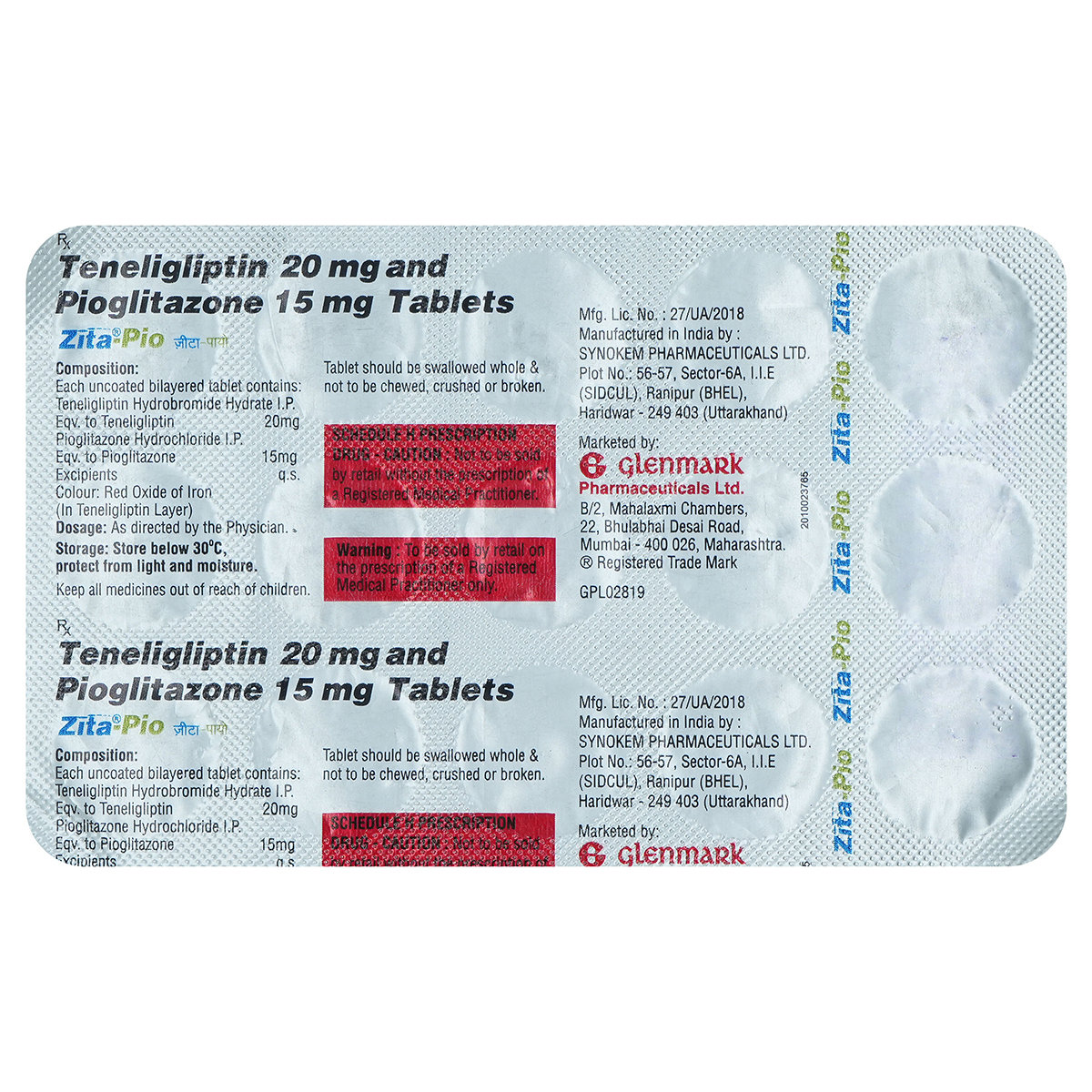- Home
- Tenepride P 20/15 mg Tablet
Tenepride P 20/15 mg Tablet Substitute
Tenepride P 20/15 mg Tablet Substitute
Medicine Composition:
PIOGLITAZONE-15MG + TENELIGLIPTIN-20MGAll Substitutes & Brand Comparisons
RX
Tendia-P Tablet 15's
Eris Life Sciences Ltd
₹186.5
(₹11.19 per unit)
11% COSTLIERRX
Zita-Pio 20 mg/15 mg Tablet 10's
Glenmark Pharmaceuticals Ltd
₹131
(₹11.79 per unit)
17% COSTLIERRX
Out of StockZita Plus -Pio Tablet 10's
Glenmark Pharmaceuticals Ltd
₹140
(₹12.6 per unit)
25% COSTLIERRX
Zita-Pio 20mg/15mg Tablet 15's
Glenmark Pharmaceuticals Ltd
₹215.5
(₹12.93 per unit)
28% COSTLIERRX
Joten-P 20 mg/15 mg Tablet 10's
Jarun Pharmaceuticals Pvt Ltd
₹160
(₹14.4 per unit)
43% COSTLIERRX
Azneten Plus Tablet 10's
Daylon healthcare pvt Ltd
₹186.5
(₹16.79 per unit)
67% COSTLIER

When Should You Consider Switching from Tenepride P 20/15 mg Tablet ?
Patients may explore substitutes in the following scenarios:
- High monthly cost of Tenepride P 20/15 mg Tablet
- Non-availability in local pharmacies
- Generic recommendation by a doctor
- Side effects or better tolerability with alternatives
What to Know Before Switching
Before you switch from Tenepride P 20/15 mg Tablet to another medicine, here are some important points to keep in mind:
Same salt, different brands:
Most substitutes contain the same active ingredient - PIOGLITAZONE-15MG + TENELIGLIPTIN-20MG, but the fillers, coating, or manufacturing quality may vary slightly.
Consult your doctor first:
Even if the salt is the same, your doctor can confirm if the substitute is right for your condition, dosage, and health history.
Watch out for allergies or reactions:
Some people may react differently to certain brands due to inactive ingredients. If you notice any side effects, inform your doctor immediately.
Price ≠ effectiveness:
A lower-priced substitute doesn't mean it's less effective. Many generic medicines work just as well as branded ones.
Check the dosage form and strength:
Always match the substitute’s strength (e.g., 5mg, 10mg) and form (tablet, capsule, syrup) with what your doctor prescribed.
Uses
Tenepride P 20/15 mg Tablet is used in the treatment of type-2 diabetes mellitus. The detailed uses of Tenepride P 20/15 mg Tablet are as follows:
- Manage type 2 diabetes mellitus: Tenepride P 20/15 mg Tablet is used to manage type 2 diabetes mellitus in adults.
- insulin sensitivity: Tenepride P 20/15 mg Tablet improves the body’s sensitivity to insulin, helping cells absorb glucose more effectively.
Medicinal Benefits
Tenepride P 20/15 mg Tablet contains Pioglitazone (thiazolidinediones) and Teneligliptin (dipeptidyl peptidase 4 inhibitors). It is used to treat type-2 diabetes mellitus. Pioglitazone lowers blood sugar levels by restoring the proper insulin amount in the body. Teneligliptin decreases the release of glucagon, a hormone that raises blood sugar levels, and increases the release of insulin from the pancreas. Together, Tenepride P 20/15 mg Tablet helps treat type-2 diabetes mellitus.
FAQs
The substitutes of Tenepride P 20/15 mg Tablet contain the same active salt(s) - PIOGLITAZONE-15MG + TENELIGLIPTIN-20MG. However, they may differ in price, manufacturing quality, and inactive ingredients. Speak to your doctor to find a suitable option.
Switching to a generic substitute medicine in the place of Tenepride P 20/15 mg Tablet is often possible if it has the same salt, strength, and dosage form. But always check with your doctor before making any changes to your medication.
Generics versions of Tenepride P 20/15 mg Tablet are typically more affordable because they don’t include the original brand's research, development, and marketing costs. They contain the same active ingredient and are approved for safety and effectiveness.
Most people don’t notice any difference. However, some may react to different fillers or coatings. If you notice any unusual symptoms after switching, consult your doctor.
Make sure the new medicine has the same active salt, strength, dosage form. Always confirm the change with your doctor or pharmacist.
Substitutes of Tenepride P 20/15 mg Tablet meet the same safety and efficacy standards as Tenepride P 20/15 mg Tablet , but small differences in absorption or formulation can exist. A doctor can help you choose the right one for your needs.
Yes. Substitutes of Tenepride P 20/15 mg Tablet may vary in color, size, or shape due to differences in manufacturing and branding, but this does not affect how they work.
Yes, it’s generally safe to switch between multiple substitutes of Tenepride P 20/15 mg Tablet if they have the same salt and strength. However, always inform your doctor so they can monitor how your body responds.
Yes, many people safely use substitutes of Tenepride P 20/15 mg Tablet for long-term treatment. Just ensure it’s done under medical supervision.
If your symptoms stay under control or lab results remain stable, the substitute for Tenepride P 20/15 mg Tablet is likely working well. Regular follow-ups with your doctor are important.
Absolutely. Even with the same salt, small differences can affect how your body responds when switching from Tenepride P 20/15 mg Tablet to its substitute. Always consult your doctor before switching.
Tenepride P 20/15 mg Tablet is used to treat type-2 diabetes mellitus.
Tenepride P 20/15 mg Tablet works by increasing the body's sensitivity to insulin and facilitates insulin release from the pancreas. Thereby, Tenepride P 20/15 mg Tablet helps treat type-2 diabetes mellitus.
Do not stop taking Tenepride P 20/15 mg Tablet without consulting the doctor, as it may increase blood glucose levels. To treat your condition effectively, continue taking Tenepride P 20/15 mg Tablet for as long as your doctor has prescribed it. Do not hesitate to speak with your doctor if you experience difficulty taking Tenepride P 20/15 mg Tablet .
In some cases, you may experience hypoglycaemia. Regularly monitor your blood sugar levels while taking Tenepride P 20/15 mg Tablet . Consume sugary food or juice if you experience symptoms of hypoglycaemia, such as headache, dizziness, drowsiness, shakiness, faintness, confusion, and visual disturbances.
Buy best Diabetics products by
Torrent Pharmaceuticals Ltd
Intas Pharmaceuticals Ltd
Eris Life Sciences Ltd
Lupin Ltd
Micro Labs Ltd
Sun Pharmaceutical Industries Ltd
Mankind Pharma Pvt Ltd
Alkem Laboratories Ltd
Lloyd Healthcare Pvt Ltd
Cipla Ltd
Macleods Pharmaceuticals Ltd
Abbott India Ltd
Primus Remedies Pvt Ltd
Glenmark Pharmaceuticals Ltd
Aristo Pharmaceuticals Pvt Ltd
Dr Reddy's Laboratories Ltd
USV Pvt Ltd
La Renon Healthcare Pvt Ltd
Wockhardt Ltd
Emcure Pharmaceuticals Ltd
Fusion Health Care Pvt Ltd
Ajanta Pharma Ltd
Ipca Laboratories Ltd
Alembic Pharmaceuticals Ltd
Corona Remedies Pvt Ltd
East West Pharma India Pvt Ltd
Hbc Life Sciences Pvt Ltd
Eswar Therapeutics Pvt Ltd
Zydus Healthcare Ltd
Alteus Biogenics Pvt Ltd
Elbrit Life Sciences Pvt Ltd
Mitoch Pharma Pvt Ltd
Medley Pharmaceuticals Ltd
Ranmarc Labs
Sinsan Pharmaceuticals Pvt Ltd
Msn Laboratories Pvt Ltd
Nirvana India Pvt Ltd
Tas Med India Pvt Ltd
Akumentis Healthcare Ltd
Arkas Pharma Pvt Ltd
Unison Pharmaceuticals Pvt Ltd
Leeford Healthcare Ltd
Acmedix Pharma Llp
Sanofi India Ltd
Q Check Pharmaceuticals
Novo Nordisk India Pvt Ltd
Blue Cross Laboratories Pvt Ltd
Xemex Life Sciences
Neucure Lifesciences Pvt Ltd
Alvio Pharmaceuticals Pvt Ltd
Anthem Bio Pharma
Spectra Therapeutics Pvt Ltd
Sydmen Life Sciences Pvt Ltd
Aareen Healthcare Pvt Ltd
Diacardus Pharmacy Pvt Ltd
Jubilant Lifesciences Ltd
Talent India Pvt Ltd
Edoc Life Sciences Pvt Ltd
Stature Life Sciences Pvt Ltd
Systopic Laboratories Pvt Ltd
Panacea Biotec Ltd
Sanz Pharmaceuticals
Shrrishti Health Care Products Pvt Ltd
Verse Lifesciences
Akesiss Pharma Pvt Ltd
Franco Indian Pharmaceuticals Pvt Ltd
Hicxica Formulations Pvt Ltd
Indoco Remedies Ltd
Lividus Pharmaceuticals Pvt Ltd
Capital Pharma
Elinor Pharmaceuticals (P) Ltd
Saan Labs
Zydus Cadila
Biocon Ltd
Eli Lilly and Company (India) Pvt Ltd
Lippon Pharma Pvt Ltd
MERAKI HEALTH
Remedy Life Sciences Pvt Ltd
Koye Pharmaceuticals Pvt Ltd
Morepen Laboratories Ltd
Eysys Pharmaceutical Pvt Ltd
MEDICAMEN BIOTECH LTD
Atos Lifesciences Pvt Ltd
Azkka Pharmaceuticals Pvt Ltd
Converge Biotech Pvt Ltd
Erinyle Health Care Pvt Ltd
Elder Pharmaceuticals Ltd
FDC Ltd
Heal (India) Laboratories Pvt Ltd
Knoll Healthcare Pvt Ltd
Jarun Pharmaceuticals Pvt Ltd
Opsis Care Lifesciences Pvt Ltd
Vasu Organics Pvt Ltd
Wallace Pharmaceuticals Pvt Ltd
CADOMAX HEALTHCARE PVT. LTD
Cadomed Pharmaceuticals India Pvt Ltd
Daylon healthcare pvt Ltd
Lincoln Pharmaceuticals Ltd
Medicure Life Sciences Pvt Ltd
Olcare Laboratories Pvt Ltd





